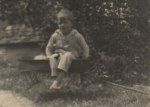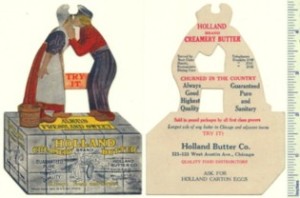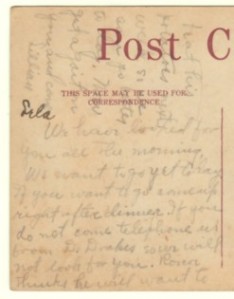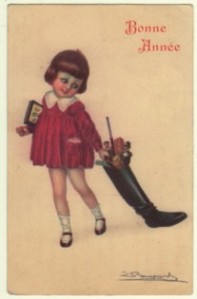 The message on this postcard back isn’t so much amusing as intriguing. It starts as follows: “Dear Annie- Was quite surprised to get a card from you, but was glad to get it you know. Am glad that you like your place and probably if (?) was there, you would be more than contented…” The next part of this message is what caught my attention. “… Haven’t been able to secure any wine yet, but as soon as I do will send some to you.” It’s signed Shakespear.
The message on this postcard back isn’t so much amusing as intriguing. It starts as follows: “Dear Annie- Was quite surprised to get a card from you, but was glad to get it you know. Am glad that you like your place and probably if (?) was there, you would be more than contented…” The next part of this message is what caught my attention. “… Haven’t been able to secure any wine yet, but as soon as I do will send some to you.” It’s signed Shakespear.
Most of the postcards I sell are from the first part of the 20th century. If alcohol or sufferage is mentioned in the message, I take a closer look at the back. This is because the message would then be a first hand account or view of a significant part of US history; in this case, Prohibition. Prohibition was the period from 1919 to 1933, during which the sale, manufacture, and transportation of alcohol for consumption was banned in the US by the 18th Ammendment to the Constitution. The postmark on this vintage postcard is either 1916 or 1918 (postmark isn’t clear enough). The 18th Ammendment was proposed in December 1917, so difficulty securing wine would make sense. The postmark might also explain why the message was signed using a pseudonym. I wonder if the sender ever secured any wine?
** If you like this post, click on the bookmark button to the right to share it.




 I was driving my Mom to her 5th chemotherapy appointment yesterday (she’s battling breast cancer), when we happened across a dead skunk right at the entrance to the hospital. As expected, it STUNK. Holding my breath didn’t work. I ended up breathing the aroma in anyway as I gasped for breath a short time later. How appropriate that the skunk was killed at the entrance. My family is hoping Mom’s cancer is rendered as lifeless as that skunk now was. So far, so good. Life sure can be a stinker sometimes.
I was driving my Mom to her 5th chemotherapy appointment yesterday (she’s battling breast cancer), when we happened across a dead skunk right at the entrance to the hospital. As expected, it STUNK. Holding my breath didn’t work. I ended up breathing the aroma in anyway as I gasped for breath a short time later. How appropriate that the skunk was killed at the entrance. My family is hoping Mom’s cancer is rendered as lifeless as that skunk now was. So far, so good. Life sure can be a stinker sometimes.







